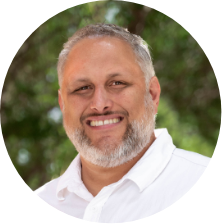
A few years ago a friend of mine was at a crossroads and reached out for help. His formative years were spent in an insecure environment alienated from both his parents, which contributed to years of drug abuse. As a young adult he placed his faith in Jesus and got plugged into one church after another where devotion was sincere but a number of major issues (i.e. theological problems, poor leadership, etc.) prevented a healthy environment for discipleship. He bore down and redoubled his effort to get better, only to find things getting worse. In his own words: “The brokenness of my past led me into a psychological hole I couldn’t dig out of, and asking God for help for years on end, particularly in the form of community, had seemingly only dug the hole deeper.” By the time he reached out for help he was near hopelessness. His marriage was in trouble, his frustration with the church was at a boiling point, and a relationship with God seemed impossible.
As he shared I listened intently, not just to what he was saying but how he was saying it. I was looking for clues to help me understand his story, listening for the story “between the lines,” the implicit beliefs driving his narrative. No doubt he was wounded; it was leaking out all over the place. What became apparent, though, was his genuine belief that his wife was the enemy, the church was a fraud, and God had either checked out or was powerless to help him. After prayerful consideration, my response was fairly simple: “If I could suggest something, I think you are living in the wrong story.”
Story is a powerful thing. We are storied creatures, and the stories we tell ourselves make up the script of our lives. A helpful way to think about this is to place stories into two categories: 1) individual and 2) collective. Individual stories are the narratives that play out internally in each unique individual. What’s fascinating is these stories, also known as autobiographical narratives, do not relate to actual events exactly 1 to 1, nor do they consist of our explicit memory of any given event alone. In fact, quite a bit of what we consider our “story” is made up of subconscious fillers linked to past contexts and experiences that play themselves out in various genres of narrative: symbolic, factual, imaginative, fantasy, etc. It’s also interesting that while these stories have been formed over time, they actually begin to be shaped from our first conscious experiences. In fact, there’s a body of research that suggests a lot of our narratives are formed even preconsciously, because we’re not born into a vacuum. Rather, we enter into stories that are already ongoing . . . stories that form and shape us as we grow and have experiences with the people and places we interact with.
Because this dynamic, formative process occurs in a social context of a myriad of other interrelated narratives, not only does it shape a single personal narrative but it also influences the narratives of others, and vice versa. In this way, we cannot talk about narrative from an individual standpoint only. It is true an individual does produce autobiographical narrative, but just as important, we produce a collective narrative every individual autobiographical narrative operates in. In this way our narratives are both created (by the individual) and found (as a community adopts various narratives it did not create).
Which brings us to the second category: collective stories. Our collective stories not only shape the broader narrative we live in but are also affected by it every day (whether we know it or not), and these stories are not static, nor are they alone.1 A helpful image is bumper cars. Each car is a car in itself, but that car is part of a chorus of cars, all of them affecting how each one operates. Interestingly, this “bumping up against” actually creates something else entirely: the experience of “bumper cars.” By definition, if the bumper car does not bump into another car, it is not a bumper car. In the same way, our individual stories both create collective narratives, but then, in turn, are influenced by the collective narratives they have created. And so, like a mirror, they reflect the culture they are born, live, and die in.
Stories mirror the culture wherein the story is created and told. Stories live in culture. They are born, they grow, they proliferate, and they eventually die according to the norms, rules, and traditions that prevail in the given society, according to a society’s implicit understanding of what counts as a tellable life . . . much of what people “remember” . . . is really shared cultural knowledge . . .2
Our individual and collective stories we live in are intricately linked to the vast array of human experiences and history down through the ages, including how we were raised, the type of environment we were raised in and what that environment valued, the experiences we’ve had, the collective events we have experienced together and how we collectively responded to those events and one another, for good or ill. These stories “carry” us along, even if, and especially when, they operate outside our conscious awareness.
Nowhere is this more significant than in the narratives that shape what we believe about God. A. W. Tozer’s line from Knowledge of the Holy is often quoted: “What comes into our minds when we think about God is the most important thing about us.”3 While this certainly has merit to it, our view of God is only part of a much more complex reality constantly playing itself out in each individual story. C. S. Lewis weighed in on this in his famous essay, “The Weight of Glory” (1949):
I read in a periodical the other day that the fundamental thing is how we think of God. By God himself, it is not! How God thinks of us is not only more important, but infinitely more important. Indeed, how we think of him is of no importance except insofar as it is related to how he thinks of us.4
Lewis is touching on another vital aspect of the stories we tell ourselves about God: not just what comes into our minds when we think about God, but what comes into God’s mind when he thinks about us. For us to get to the core of the narrative someone is telling about God, both aspects must be considered. I would not dare claim to be in the same company as Lewis and Tozer; however, if I may be so bold, I humbly submit there is a third aspect that must be considered. Not only must we examine how we view God and how he views us, we must pay attention to how we emotionally respond when we do examine those views. For a myriad of reasons I explore elsewhere, we have been formed primarily to think about how we view God and to think about how he views us. We are far more comfortable telling ourselves a story with a neat, clean systematic doctrinal framework than we are actually asking the question: “What is my actual experience of God?” “What does God feel like?” “How do I feel about how I feel he feels about me?” But stories are not cold plot lines, especially the stories we live in. We do not read our autobiographical narratives . . . we experience them. If we are to arrive at the power of our story(ies) of God, we must consider 1) what we believe about God, 2) what we believe God feels about us, and 3) what we emotionally experience when we relate to God. Unless we do this, we will live unexamined lives, carried along by stories that misrepresent God in ways and tempt us to relate to him in dysfunctional ways.
Our relational patterns with God live in the context of our autobiographical narratives. God definitely shapes our stories, but equally as important, the stories we live in shape the way we experience God. That story exists in competing contexts, narratives, and stories that press in on it and influence not only how it is formed but also how and to what degree it develops over time. These competing narratives are constantly jockeying for that dominant position of the strongest voice in the cultural narrative chorus.5 One need only read the news to see how pervasive conflicting narratives are, and to what extent each narrative will go to eliminate competing narratives. This plays out in every sphere and on every level of human existence: global, national, local, and even familial and personal. As we will see, the history of the evangelical narrative in America reveals a startling picture of how we’ve arrived at the current collective story of God, and how those stories continue to shape our lives today.

